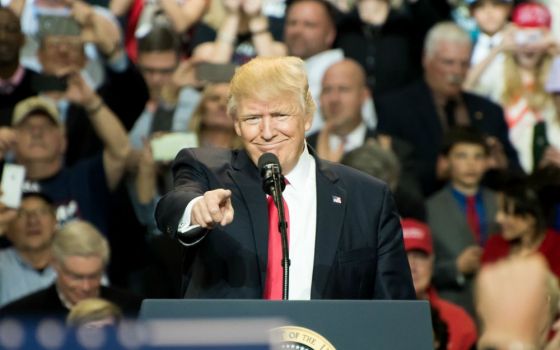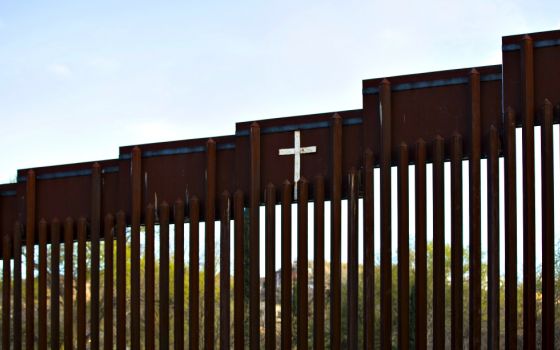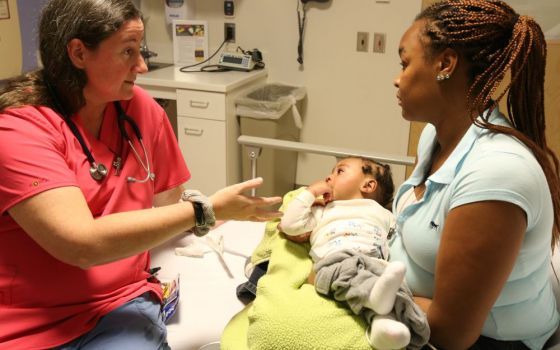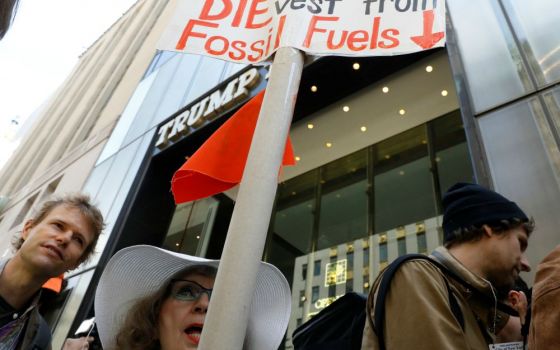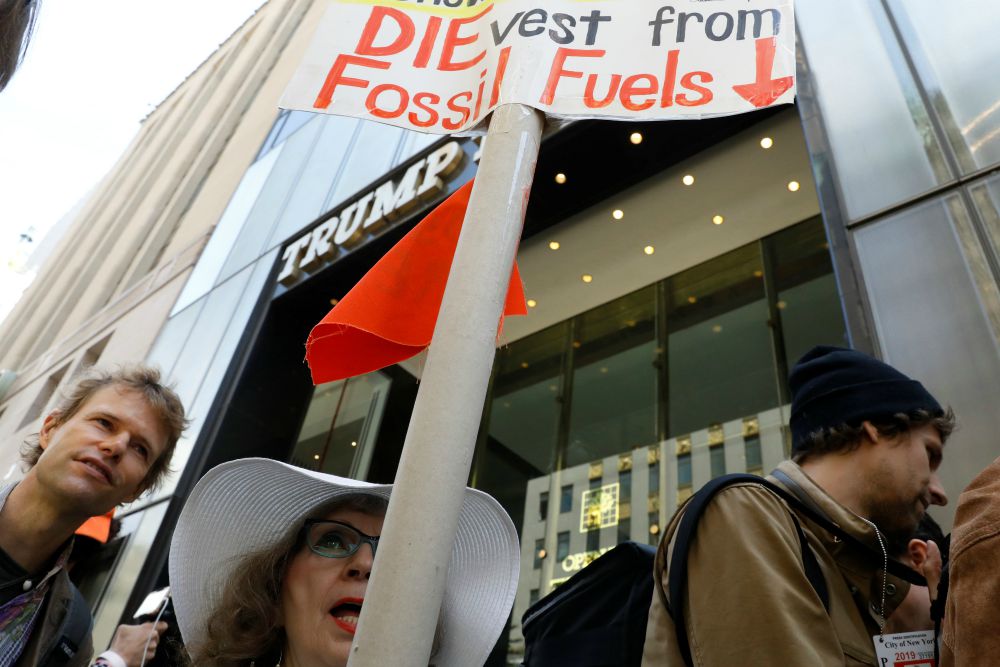
Protesters gather for a fossil fuel and climate change protest outside Trump Tower May 9 in New York City. (CNS/Reuters/Brendan McDermid)
After a September visit to Florida to survey damage waged by Hurricane Irma, President Donald Trump was asked whether the storm, along with Hurricane Harvey in the Gulf Coast, had changed his views on climate change.
"We've had bigger storms than this," he told reporters on Air Force One.
Since routinely stating on the campaign trail the false belief that climate change is a hoax devised by China, Trump has been mum in further elaborating those opinions. But the bevy of actions undertaken in his administration's first nine months has sent a clear signal of little intent to prioritize climate or other environmental concerns.
Trump formally announced his intention to pull the U.S. from the international Paris Agreement on climate change. He said he would cancel future payments to the Green Climate Fund. He authorized construction of the Dakota Access pipeline, in operation since June, and the Keystone XL transnational pipeline. He has directed his administration to roll back upwards of 50 environmental regulations, including a proposed repeal of the U.S. Environmental Protection Agency's Clean Power Plan rule on greenhouse gas emissions from existing power plants.
A Trump budget proposal sought to slash EPA funding by a third and its staff by 20 percent, while Administrator Scott Pruitt, who sued the agency more than a dozen times as Oklahoma attorney general, has worked to dismantle the agency from within. Trump has also ordered a review of recently designated national monuments and sought to expand drilling and mining on public lands, coastal waters and the Arctic.
"I think he's pretty much kept his promises, which is to dramatically scale back environmental regulations," said Dan Misleh, executive director of Catholic Climate Covenant.
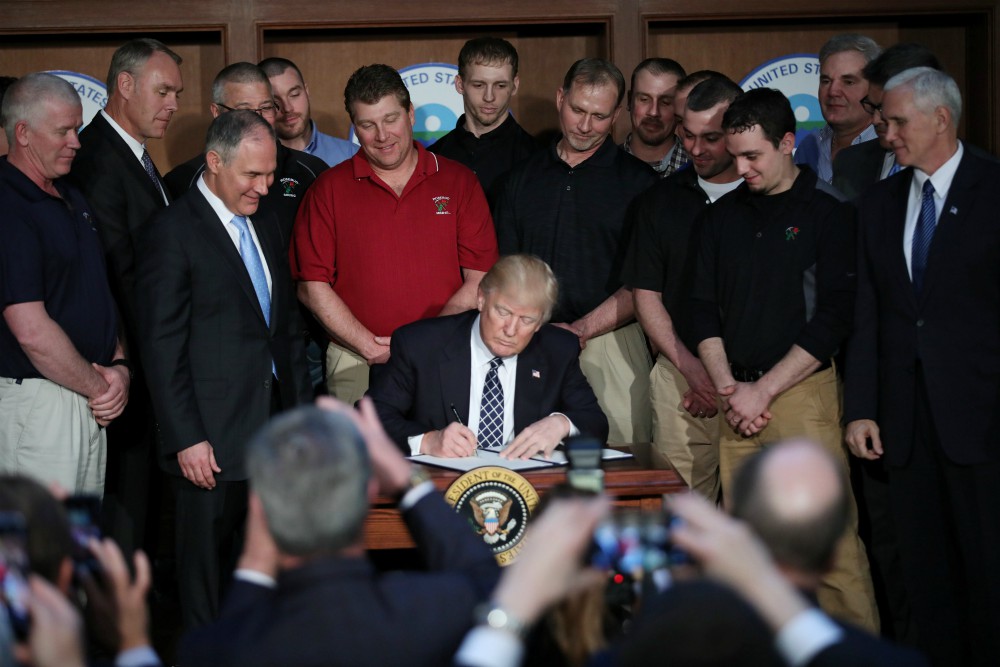
U.S. President Donald Trump signs an executive order titled "Energy Independence" during a March 28 event at the Environmental Protection Agency headquarters in Washington. The order eliminated Obama-era climate change regulations and called for a review of President Barack Obama's Clean Power Plan. (CNS/Reuters/Carlos Barria)
In nearly every instance, Trump framed his environmental policies in economic terms, that fewer regulations will unburden businesses and usher in unprecedented energy production (primarily from fossil fuels). He has largely refrained from discussing environmental and health impacts of such moves, offering instead a loose overarching policy focused on clean air and water.
"We're going to have safety, we're going to have clean water, we're going to have clear air," said the president, surrounded by coal miners March 28 at EPA headquarters as he signed a far-reaching executive order aimed at ending a series of environmental regulations. "But so many [regulations] are unnecessary, and so many are job killing. We're getting rid of the bad ones."
Trump's announcement that he would pull the U.S. out of the Paris climate accord came just days after he met with Pope Francis at the Vatican, where the pope presented the president with a copy of his encyclical "Laudato Si', on Care for Our Common Home." As the next round of United Nations climate negotiations began Nov. 6, news reports indicated Trump officials at COP23 would tout fossil fuels and nuclear energy as climate solutions.
Three days earlier, the first part of the fourth National Climate Assessment, by law published every four years by 13 federal agencies, stated the current period "is now the warmest in the history of modern civilization" and that average global temperatures have risen 1 degree Celsius (1.8 degrees Fahrenheit) since 1901. The report concluded "it is extremely likely that human activities, especially the emissions of greenhouse gases, are the dominant cause" of the planet's warming, adding "there is no convincing alternative explanation."
The scope and speed of environmental rollbacks under Trump, combined with growing evidence of climate change, have triggered an urgency among Catholic groups to speak loudly, and often frankly, in opposition. They have criticized the decisions as detrimental not only to the planet — in scaling back climate action by the U.S., the present-day no. 2 global polluter and historical leader — but for people, particularly the poor. Through their ministries, they have witnessed how people in the U.S. and abroad have suffered from droughts and natural disasters worsened by global warming, including the ongoing disaster in Puerto Rico following Hurricane Maria, and have experienced in neighborhoods health complications from added pollution accompanying relaxed environmental laws.
"What's so disturbing is that there does not seem to be any even moral compass or moral consciousness about the activity that our leadership is engaged in," said Sr. Patricia McDermott, president of the Sisters of Mercy of the Americas.
Misleh called "a sin" the decision to end future U.S. payments to the Green Climate Fund, the international program that assists developing countries in climate adaptation/mitigation efforts. Catholic Relief Services deemed the Paris Agreement pullout "a terrible — and we hope reversible — mistake." McDermott cast EPA's proposed Clean Power Plan withdrawal as "deeply immoral and death dealing."
Advertisement
In his statement on the carbon rules repeal effort, Bishop Frank Dewane, chairman of the U.S. bishops' Committee on Domestic Justice and Human Development, said such a course change by EPA "solidifies the already troubling approach of our nation in addressing climate change."
It is a unique moment, McDermott told NCR.
"It asks of us a different vigilance, a different commitment and certainly, the challenge for us to speak more clearly, more boldly and more intentionally about what we see," she said.
Motivation for increased mobilization, lawsuits
Dewane, head of the Diocese of Venice, Florida, told NCR the country's move away from its obligation to care for creation under Trump "causes us concern." The U.S. Conference of Catholic Bishops has issued eight letters and statements to the Trump administration and Congress resisting proposed actions, and has held discussions with EPA officials and legislators.
So far, the collective calls from Catholics, including a petition with 15,000-plus signatures, have not had an effect in swaying the president to adjust course on environmental issues. But the body of moves by Trump has had the side effect of galvanizing people and organizations, both religious and secular, in opposition.
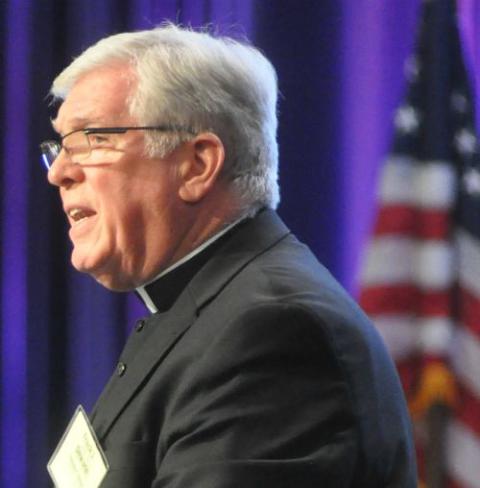
Bishop Frank Dewane of Venice, Florida, speaks June 15 during the U.S. Conference of Catholic Bishops' annual spring assembly in Indianapolis. (CNS photo/The Criterion/Sean Gallagher)
Catholic Climate Covenant and Catholic Relief Services both reported upticks in engagement from their members and supporters in the past year, particularly around the exit from the Paris Agreement — a move that cannot formally go into effect until Nov. 4, 2020, a day after the next presidential election.
"If nothing else, it's really woken up our consciousness and our commitment to doing better," said Adrianna Quintero, director of partner engagement for the Natural Resources Defense Council and founder/director of Voces Verdes, a coalition of Latino leaders on sustainable environmental progress.
There have been lawsuits and mass mobilizations, with Catholic groups and religious orders joining both the March for Science on Earth Day, and People's Climate March a week later. In September, the Sisters of Mercy signed onto a "friend of the court" brief supporting 21 young people suing the federal government to act on climate change.
So far, much of the resistance has been just that, Quintero said, in "holding the line" to protect environmental laws under threat. "There's a limited number of hours in the day, and this is a very active administration that is very actively trying to erase all the environmental progress that we've made, frankly, over the past 50 years."
She added what distinguishes the current attacks on environmental policies from those of the past is a concerted effort to discredit science and limit public access. Trump has yet to nominate a science advisor, and information on climate change has been scrubbed from websites for the White House, EPA and Department of the Interior.
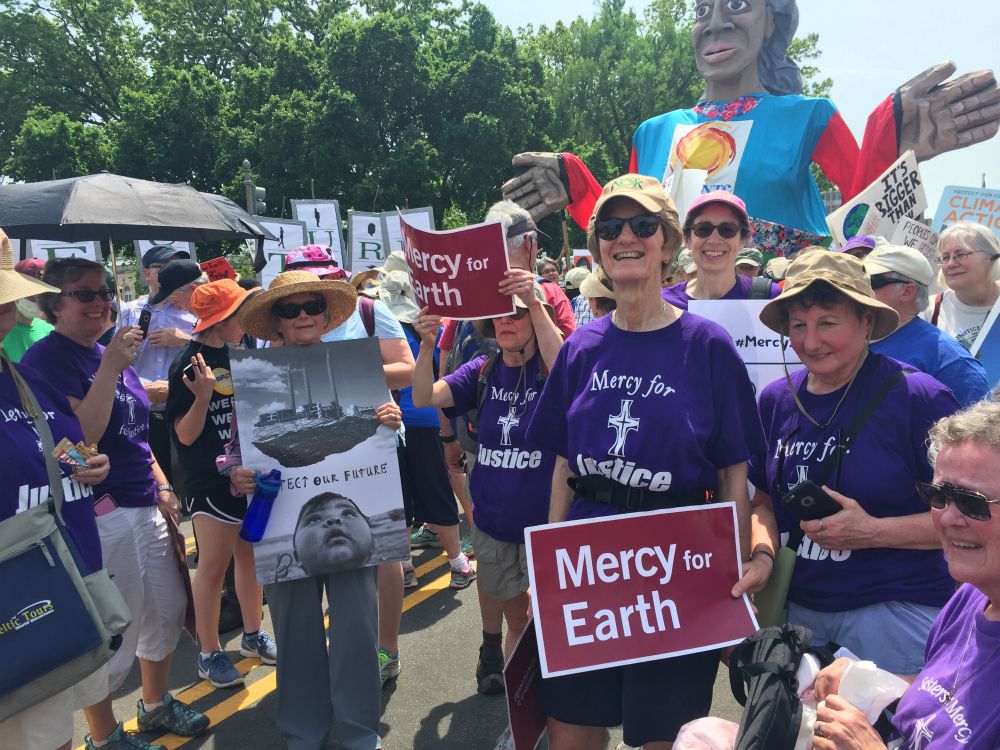
Mercy sisters joined tens of thousands of other demonstrators in the People’' Climate March in Washington, D.C., on April 29. The march was aligned with President Donald Trump's 100th day in office. (Mercy Sisters of the Americas)
At the same time, the Government Accountability Office has estimated the economic hit of climate change on the U.S. could equate to 2.4 percent of the nation's annual GDP by the end of the century, with costs related to deaths from higher temperatures totaling as much as $506 billion per year.
Climate caucus resists presidential actions
While open to communication with the White House, many seeking federal action on climate change have turned attention, and hope, to Congress — itself a force of resistance on environmental initiatives during President Barack Obama's eight years in office — and specifically, the growing Climate Solutions Caucus within the House or Representatives.
Intentionally bipartisan, the caucus' membership is equal parts Democrat and Republican. After beginning with a dozen representatives in February 2016, it reached 60 members in early October.
"I really think this caucus is the only way forward on climate change," Rep. Carlos Curbelo (R-Florida), co-founder and co-chair of the caucus, told NCR.
Representing Florida's southern tip, which encompasses the Everglades and Key West, Curbelo, who is Catholic, said climate impacts like sea level rise aren't talking points for people in his district and others situated along coasts, but something they already face.
"This is all very real to us," he said.
The caucus began with dialogue to better understand the challenges posed by climate change. Eventually, it hopes to bring forth legislation.
For now they too have been in a "blocking and tackling phase" to stop bills seen as worsening climate change or not contributing to solutions. An early victory came in defeating an amendment to a defense funding bill that would have nixed a required study on climate risks to military facilities.
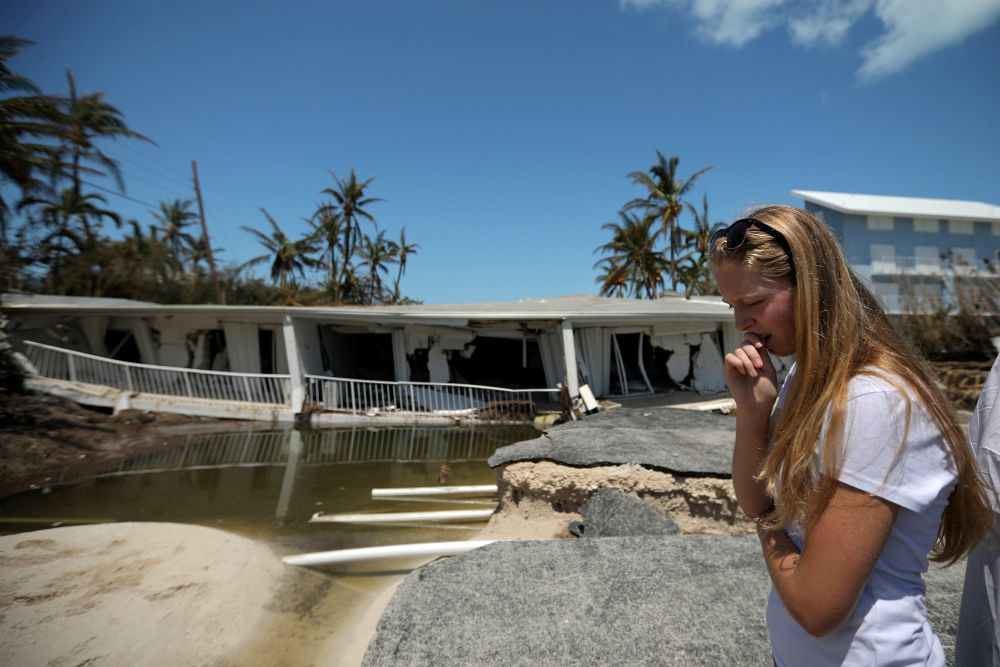
A woman reacts as she sees her destroyed home Sept. 12 in the aftermath of Hurricane Irma in Islamorada Key in the Florida Keys. (CNS/Reuters/Carlos Barria)
The caucus and its members have also been vocal in criticizing the Trump administration's environmental actions, including the planned Paris withdrawal and potential Clean Power Plan repeal.
"The administration is in some ways leaving a vacuum of leadership on the issue climate policy," Curbelo said. "And in my view, that just means that Congress has to step up and fill that void and show that we want to promote both a future of economic prosperity and growth and a future of responsible and sustainable climate policy."
The U.S. bishops' conference has publicly supported the caucus in two letters — including the establishment of a National Climate Solutions Commission — and joined other Catholic and secular groups, such as Citizens Climate Lobby, in encouraging more House members get on board.
"We need to build political space for climate change to be an issue that can be addressed in a bipartisan fashion," said Eric Garduno, senior policy and legislative specialist for Catholic Relief Services.
Local government, diocesan policies push on
Beyond Washington, hope on environmental issues has emerged in cities and states.
In response to Trump's Paris exit announcement, 14 states and Puerto Rico formed the U.S. Climate Alliance to continue working toward the U.S. target under the accord: reducing greenhouse gas emissions by 26 to 28 percent below 2005 levels by 2025. In addition, 382 mayors, representing one-fifth of the nation's population, committed to taking steps to meet the climate goals and create a clean energy economy.
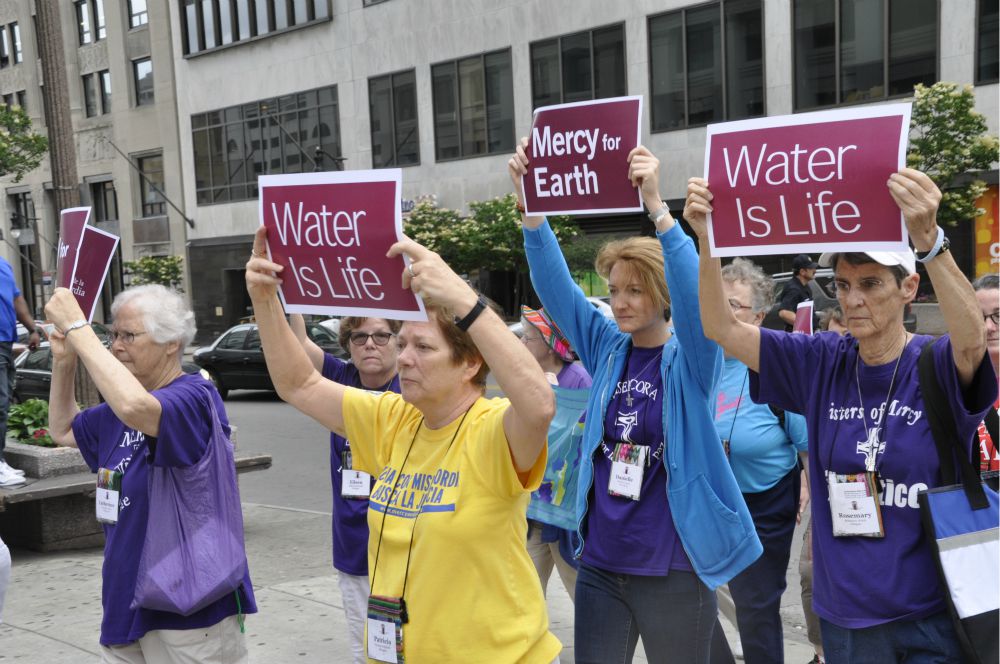
Mercy Srs. Catherine Kuper, Eileen McDonnell, Patricia Mulderick, Danielle Gagnon and Rosemary Welsh carry signs saying "Water is Life" and "Mercy for Earth" during the Walk for Water in Buffalo, New York, on June 23. The Mercy sisters have intentionally sought ways to stress the moral urgency for creation care since the election of President Donald Trump, which Mercy president Sr. Patricia McDermott brought about "a different vigilance … to speak more clearly, more boldly and more intentionally." (Mercy Sisters of the Americas)
Within the church, Catholic Climate Covenant launched in October its Catholic Energies program, after piloting it in the Cincinnati Archdiocese, aimed at helping dioceses and parishes make their buildings more energy efficient. It also continues to partner with the bishops' conference in rolling out an initiative to help priests become more comfortable incorporating Laudato Si' into homilies.
Dewane said conversations within the bishops' conference about what more it can do on environmental concerns have looked at encouraging more bishops to implement energy efficiency and renewable energy in their dioceses. The conference has also offered support for the Nonprofit Energy Efficiency Act, introduced in the House in April and co-sponsored by seven members of the Climate Solutions Caucus.
"The bishop is the one who's going to decide if he's going to take it on, but I think we have a lot more bishops who are aware of it now and willing to have the conversation," said Dewane, who has worked with parishes in his Venice diocese considering solar installations.
New and developing partnerships are another positive that has emerged from the Trump administration's attacks on environmental policies. The Sisters of Mercy, deeply engaged in creation care for more than two decades, said they've been more vigilant in expanding their networks.
"There is a solidarity now that probably many of us haven't felt in a long time," Mercy Sr. Aine O'Connor said.
The connections are being made not only among groups but across issues, Quintero said, in that people are drawing lines between increases in air pollution at the same time health insurance plans becomes less accessible. As more and more organizations widen their scope, challenges like climate change become less an exclusively environmental issue, but everyone's issue.
That development is a welcome "grace moment," McDermott said, with Mercy sisters placing emphasis on identifying the links among environmental issues, poverty, racism and discrimination, and the root causes underlying them. That growing awareness comes at a moment of moral urgency, she said, that began before Trump's election but has only accelerated since.
"We wouldn't choose this administration and the impact and the challenges that they're presenting, but we're ready to respond to them," she said.
[Brian Roewe is an NCR staff writer. His email address is broewe@ncronline.org. Follow him on Twitter: @BrianRoewe.]




